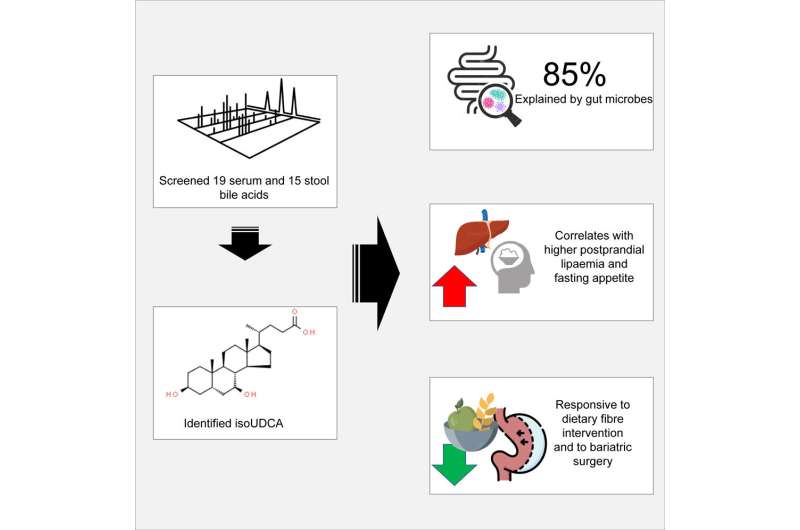This article has been reviewed according to Science X's editorial process and policies. Editors have highlighted the following attributes while ensuring the content's credibility:
fact-checked
peer-reviewed publication
trusted source
proofread
Study findings could pave the way for development of new strategies to prevent and treat obesity

New research has shown that weight loss, or bariatric, surgery can significantly alter the levels of bile acid associated with higher appetite, as can taking fiber supplements but to a lesser degree.
Bariatric surgery can be used as a treatment for people who are very obese and there are several types of surgery available, such as reducing the size of the stomach or rerouting the top part of the stomach to the small intestine. It's an invasive procedure but can lead to significant improvements in weight loss, metabolic health, and a reduction in appetite—though the reasons for this are unknown. Bile acids are a marker of poor cardiometabolic health that can affect liver function and inflammation.
A study, published today in Cell Reports Medicine by researchers from the University of Nottingham, King's College London and Amsterdam University Medical Center, has shed light on the molecules underlying the benefits of this kind of surgery on patient appetite and metabolism.
Researchers studied a group of patients in Amsterdam who had undergone bariatric surgery by measuring levels of bile acids before surgery and a year post-operation. They also studied bile acids from two population studies—TwinsUK, run by King's College London, and PREDICT, run by King's College London and nutrition company ZOE.
The study found that a specific bile acid called isoursodeoxycholate (isoUDCA), which is associated with higher appetite and worse metabolic levels, decreased after bariatric surgery and after taking fiber supplements. Levels of isoUDCA did not decrease after consuming omega-3 supplements.
Joint lead author Professor Ana Valdes from the University of Nottingham's School of Medicine said, "Bariatric surgery is not only extremely effective at helping people lose weight by reducing their appetite, but also improves their liver function and their metabolism."
"What our study shows is that specific microbial metabolite is involved in some of these benefits and that, although to a more modest extent, dietary fiber might mimic some of these effects," says Valdes. "This could help design dietary supplementation studies aimed at increasing satiety and improving liver parameters."
By understanding these mechanisms, scientists may be able to develop new interventions that mimic the effects of bariatric surgery without putting patients through the procedure itself. Bariatric surgery is also only suitable for those who are severely obese, and understanding whether isoUDCA can be modified by lifestyle interventions could lead to more targeted treatments for obesity.
Joint lead author Dr. Cristina Menni, from King's College London, said, "The study's results have important implications for the development of targeted interventions for metabolic disorders focused on the gut microbiome."
"By better understanding the complex interplay between genetics, the gut microbiome, and diet in regulating bile acid levels and their impact on appetite and metabolic health, we may be able to develop new strategies for preventing and treating obesity and metabolic syndrome," says Menni.
Another key finding was seeing the strong influence of gut microbes on the levels of isoUDCA. This confirms that the gut microbiome is key to determining the outcomes of bariatric surgery and sheds light on the ways in which gut microbes modify a person's metabolism.
Co-author Professor Tim Spector, Professor of Genetic Epidemiology at King's College London and co-founder of ZOE, the personalized nutrition company, said, "This study highlights the key role that fiber plays in appetite regulation and metabolism, harnessed by specific gut microbes. Advanced gut microbiome testing (as used by ZOE) provide personalized insights that can support metabolic health. The gut microbiome and its chemical products such as these bile acids hold huge promise for reducing obesity without the need for invasive surgery."
More information: Cristina Menni, The secondary bile acid isoursodeoxycholate is associated with postprandial lipaemia, inflammation and appetite, and changes post bariatric surgery, Cell Reports Medicine (2023). DOI: 10.1016/j.xcrm.2023.100993. www.cell.com/cell-reports-medi … 2666-3791(23)00099-X





















